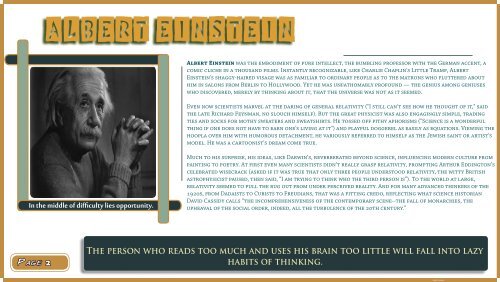You also want an ePaper? Increase the reach of your titles
YUMPU automatically turns print PDFs into web optimized ePapers that Google loves.
Albert Einstein<br />
Albert Einstein was the embodiment of pure intellect, the bumbling professor with the German accent, a<br />
comic cliche in a thousand films. Instantly recognizable, like Charlie Chaplin's Little Tramp, Albert<br />
Einstein's shaggy-haired visage was as familiar to ordinary people as to the matrons who fluttered about<br />
him in salons from Berlin to Hollywood. Yet he was unfathomably profound — the genius among geniuses<br />
who discovered, merely by thinking about it, that the universe was not as it seemed.<br />
Even now scientists marvel at the daring of general relativity ("I still can't see how he thought of it," said<br />
the late Richard Feynman, no slouch himself). But the great physicist was also engagingly simple, trading<br />
ties and socks for mothy sweaters and sweatshirts. He tossed off pithy aphorisms ("Science is a wonderful<br />
thing if one does not have to earn one's living at it") and playful doggerel as easily as equations. Viewing the<br />
hoopla over him with humorous detachment, he variously referred to himself as the Jewish saint or artist's<br />
model. He was a cartoonist's dream come true.<br />
In the middle of difficulty lies opportunity.<br />
Much to his surprise, his ideas, like Darwin’s, reverberated beyond science, influencing modern culture from<br />
painting to poetry. At first even many scientists didn’t really grasp relativity, prompting Arthur Eddington’s<br />
celebrated wisecrack (asked if it was true that only three people understood relativity, the witty British<br />
astrophysicist paused, then said, “I am trying to think who the third person is”). To the world at large,<br />
relativity seemed to pull the rug out from under perceived reality. And for many advanced thinkers of the<br />
1920s, from Dadaists to Cubists to Freudians, that was a fitting credo, reflecting what science historian<br />
David Cassidy calls “the incomprehensiveness of the contemporary scene--the fall of monarchies, the<br />
upheaval of the social order, indeed, all the turbulence of the 20th century.”<br />
Page 2<br />
The person who reads too much and uses his brain too little will fall into lazy<br />
habits of thinking.<br />
Abhi Sharma


